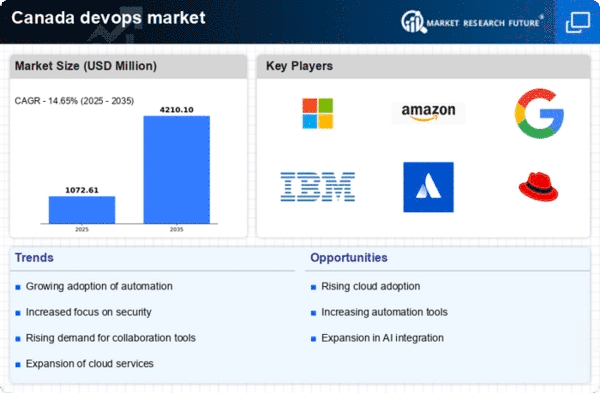Focus on Enhanced Collaboration
Enhanced collaboration between development and operations teams is emerging as a critical driver in the devops market in Canada. Organizations are increasingly recognizing that fostering a collaborative culture can lead to improved efficiency and faster delivery times. In 2025, it is anticipated that over 60% of Canadian companies will implement collaborative tools and practices to bridge the gap between these traditionally siloed departments. This shift is likely to result in a more integrated approach to software development and deployment, ultimately enhancing the overall performance of IT operations. The emphasis on collaboration is expected to be a key factor in the growth of the devops market, as companies strive to create a more cohesive working environment.
Investment in Cloud Infrastructure
The devops market in Canada is significantly influenced by the increasing investment in cloud infrastructure. As businesses transition to cloud-based solutions, the demand for devops practices that facilitate seamless integration and deployment in cloud environments is rising. In 2025, it is projected that cloud spending in Canada will reach approximately $10 billion, reflecting a compound annual growth rate of around 20%. This investment is likely to drive the adoption of devops tools and practices that optimize cloud operations, enhance scalability, and improve resource management. Consequently, organizations are expected to leverage devops methodologies to maximize the benefits of their cloud investments, thereby stimulating growth in the devops market.
Growing Demand for Agile Development
The devops market in Canada is experiencing a notable shift towards agile development methodologies. Organizations are increasingly recognizing the need for rapid software delivery and iterative development processes. This demand is driven by the necessity to respond swiftly to market changes and customer feedback. In 2025, it is estimated that agile practices will be adopted by over 70% of Canadian software development teams. This trend is likely to enhance collaboration between development and operations teams, thereby fostering a culture of continuous improvement. The growing emphasis on agile methodologies is expected to propel the devops market, as companies seek to integrate these practices into their workflows to achieve greater efficiency and responsiveness.
Rising Importance of Compliance and Governance
The devops market in Canada is increasingly shaped by the rising importance of compliance and governance. As regulatory requirements become more stringent, organizations are compelled to adopt devops practices that ensure compliance throughout the software development lifecycle. In 2025, it is estimated that compliance-related investments will account for approximately 15% of total IT budgets in Canada. This focus on governance is likely to drive the adoption of automated compliance tools and practices within the devops framework, enabling organizations to maintain regulatory standards while accelerating their development processes. Consequently, the integration of compliance measures into devops practices is expected to be a significant driver of growth in the devops market.
Emergence of AI and Machine Learning Technologies
The integration of AI and machine learning technologies is poised to transform the devops market in Canada. Organizations are increasingly exploring how these advanced technologies can enhance automation, predictive analytics, and decision-making processes within their devops practices. In 2025, it is projected that the adoption of AI-driven tools in the devops market will increase by over 30%. This trend suggests that companies will leverage AI to optimize their development pipelines, improve incident response times, and enhance overall operational efficiency. The emergence of AI and machine learning is likely to be a pivotal factor in shaping the future of the devops market, as organizations seek to harness the power of these technologies to drive innovation and competitiveness.
















